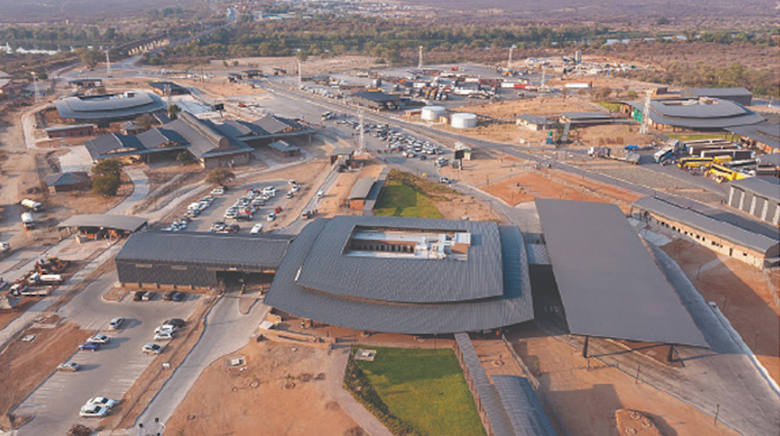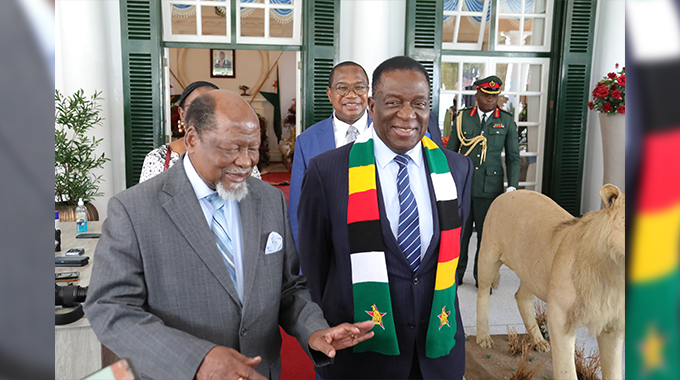WATCH: ‘Sanctions or no sanctions, Zimbabwe will prevail’

Nqobile Tshili, [email protected]
ZIMBABWE will prevail in advancing its national development agenda with or without Western-imposed sanctions by embracing innovation and riding on maximum usage of local resources to boost its economic transformation in line with the vision of achieving an upper-middle-income status by 2030.
Deputy Chief Secretary to the Office of the President and Cabinet in charge of policy analysis, coordination, and development planning, Mr Willard Manungo, said this yesterday as he rallied Zimbabweans to work hard and challenged Government agencies and departments to pursue inclusive development approaches to ensure ordinary people derive maximum benefit.
Zimbabwe was slapped with sanctions at the turn of the millennium after the Government decided to correct colonial injustices where prime land was only in the hands of a few whites. By imposing sanctions against Zimbabwe, the country’s detractors sought to spark regime change through crippling economic productivity to incite the masses.
Zimbabweans, however, have demonstrated resilience and unflinching allegiance to the Government, which has recorded major successes across sectors as part of the sanctions-busting initiatives.
As such, Mr Manungo said in line with “ilizwe lakhiwa ngabanikazi balo/nyika inovakwa nevene vayo” philosophy by President Mnangagwa, the country was focused on inward rebuilding the economy.
“As the Government, as a people, and as a country we have said through the mantra, which His Excellency, the President has shared with the nation, we are responsible for our destiny. Sanctions or no sanctions we will prevail,” said Mr Manungo.
“Over the last 23 years, notwithstanding the illegal sanctions that have been imposed on Zimbabwe, we have been able to realize major milestones across various fronts.”
The Deputy Chief Secretary said through investments in revitalizing the agriculture sector, the country is now food secure. The Government has invested US$2 billion towards the construction of dams and irrigation infrastructure as part of the measures to ensure the country is food secure.
Mr Manungo said Zimbabwe’s national food security was impacting positively on the region as well as the continent. In 2022, for instance, the country was one of the two African countries to be wheat self-sufficient due to the investments in the agriculture sector.
“Beyond food security across all the other sectors, it could be energy, it could be infrastructure, we have soldiered. On the load shedding challenges that we have been experiencing over the last few years, we have been one of the few countries in the region to overcome it through massive investments initially at Kariba [Hydro Power Station] and later at Hwange [Thermal Power Station]” said Mr Manungo.
He said the recent increase in power generation was having a positive impact across various sub sectors of the economy including agriculture, mining, and manufacturing.
“We have also been able to contribute to the regional development by ensuring that Zimbabwe plays its part by having its national infrastructure integrate into various corridors from the south to the north and to the east and to the west by the massive investments to upgrade the road infrastructure, and also ensure that the air linkages to Zimbabwe is doing its part,” said Mr Manungo.
“We have said as a Government, as a people, the illegal sanctions on Zimbabwe should be removed but we are not using sanctions as an excuse for not forging ahead.
“If anything, it is giving us additional strength to try and ensure that we are consistent with our national vision towards an upper middle-income economy by 2030.”
Mr Manungo said the Government is also implementing policies that ensure inclusive development through devolution and decentralisation policy.
He said President Mnangagwa has directed the Treasury to allocate resources with the hope of transforming communities.
“We are marshalling all the resources that we have to try and overcome the illegal sanctions to ensure that we contribute to the national development and contribute to the regional development, as well as the continental development,” he said.
“There is now a requirement from His Excellency, the President that our colleagues at the Treasury in terms of the transfer of the intra-Governmental financial resources, they also are guided by ensuring that no place is left behind, no individual is left behind.”

Mr Manungo said the Government expects citizens to also play a critical role in the anti-sanctions agenda through participating in economic growth.
“The citizenry are the centre stage, President Mnangagwa emphasises day in day out that the interventions that we make people remain pro-people and pro-centred, pro-community.
“So, the whole idea of our devolution and decentralisation agenda is to ensure that the communities that we have across the country have an opportunity to play their part in championing their own destinies,” said Mr Manungo.
He said it was pleasing that the anti-sanctions agenda has attracted continental bodies. Sadc, in solidarity with Zimbabwe declared October 25 as Anti-Sanctions Day in realisation that the negative effects of the embargo were spilling to neighbouring countries.
“We want the sanctions on Zimbabwe to be lifted. That message has gone beyond Zimbabwe, it is now a regional message at the Sadc level.
“The message has gone beyond the region, it is a continental message that is coming out from the African Union,” said Mr Manungo.
“It is a message coming beyond the continent from all the progressive forces to say the sanctions on Zimbabwe should be lifted,” he said. — @nqotshili











Comments